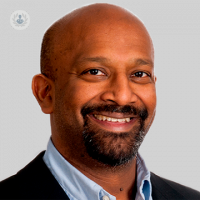Understanding neck lumps: A comprehensive guide
Autore:In his latest online article Mr Ram Moorthy gives us an insight into neck lumps. He explains when you should seek medical attention, the pain, treatment and when surgery is required.

When should I seek medical attention for neck lumps?
Any instance of a lump in the neck arises from an underlying issue, and the majority of cases can be attributed to infections, which typically improve within one or two weeks. It is advisable that any neck lump persisting beyond three weeks be brought up with your general practitioner (GP). Subsequently, your GP may deem it necessary to refer you to a specialist, such as a neck surgeon, for a more thorough evaluation. This step is warranted due to the extensive array of potential causes, ranging from simple skin abnormalities like sebaceous cysts or fatty lumps known as lipomas, to benign growths affecting structures, and even the possibility of cancer. This complex range of conditions necessitates specialised assessment and investigative procedures to accurately diagnose and address the issue.
Can neck lumps be painful?
A neck lump often becomes painful if it is linked to an infection or an abscess, wherein puss accumulates beneath the skin. Conversely, numerous neck lumps, particularly those that endure over time and even those indicative of cancer, might initially lack pain, although discomfort may arise at a later stage.
How are neck lumps treated?
The important thing is achieving an accurate diagnosis, which involves taking a patient's medical history and examining various factors such as the duration, location, and associated symptoms of the neck lump. This thorough assessment encompasses physical examinations, including tactile exploration of the neck and examinations of the oral, nasal, and ear passages, along with a gentle endoscopic examination of the throat, all conducted within an outpatient setting. Following these evaluations, immediate diagnoses can be provided for certain conditions like sebaceous cysts, lipomas, or fatty lumps.
However, many cases necessitate further investigation, often entailing an ultrasound scan of the neck to find the underlying issue. In some instances, a biopsy is arranged using a fine needle to gather microscopic cell samples, while blood tests may also be conducted to gauge infection indicators or assess the function of involved structures. Depending on the findings, a CT scan or MRI scan might be required to achieve a comprehensive diagnosis. Once a diagnosis is established, a detailed discussion with the patient follows. Treatment paths diverge based on the specific diagnosis. Some cases might be managed conservatively without intervention, while others could necessitate medication – particularly for infections requiring antibiotics. Surgical intervention might be warranted to excise the lump(s) and resolve the issue.
When is surgery for neck lumps required, and what does this surgery involve?
As previously outlined, the approach taken depends on the specific situation at hand. Common neck lumps may stem from issues with the salivary gland, potentially necessitating a surgical procedure to excise both the lump and the affected gland. Another prevalent scenario involves nodules linked to the thyroid gland. Although most of these cases can be managed non-surgically, surgical intervention might be warranted if suspicion arises regarding cancer presence, if there's evident malignancy, or if the nodules are sizeable and inducing symptoms in the patient.
Another significant category involves lymph nodes. In the case of infection-related swelling, surgery is generally unnecessary. However, lymph nodes can also serve as an indicator of cancer, potentially requiring surgical intervention as part of the overall cancer treatment strategy. It is crucial, though, that a specialist with expertise in this field evaluates these cases comprehensively. This ensures a thorough diagnosis and permits a comprehensive discussion between the specialist and the patient regarding potential diagnoses and the array of management options available. It's worth noting that surgical intervention might not always be required or needed.
Mr Ram Moorthy is a highly regarded ENT specialist with over 20 years of experience. You can book an appointment with Mr Moorthy on his Top Doctors profile.



